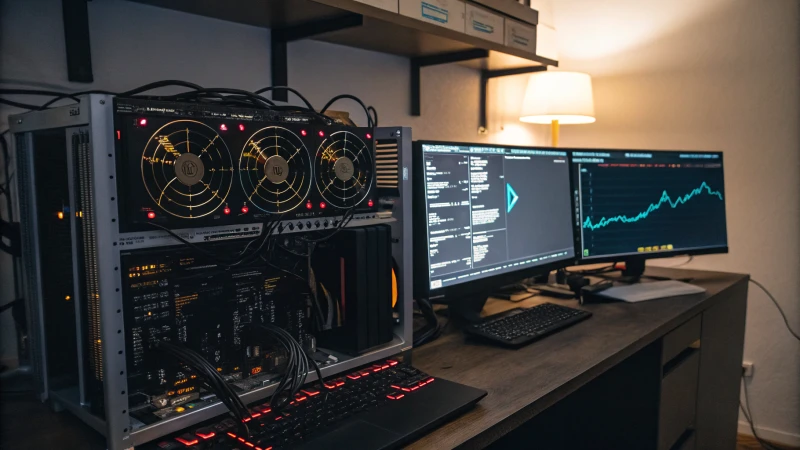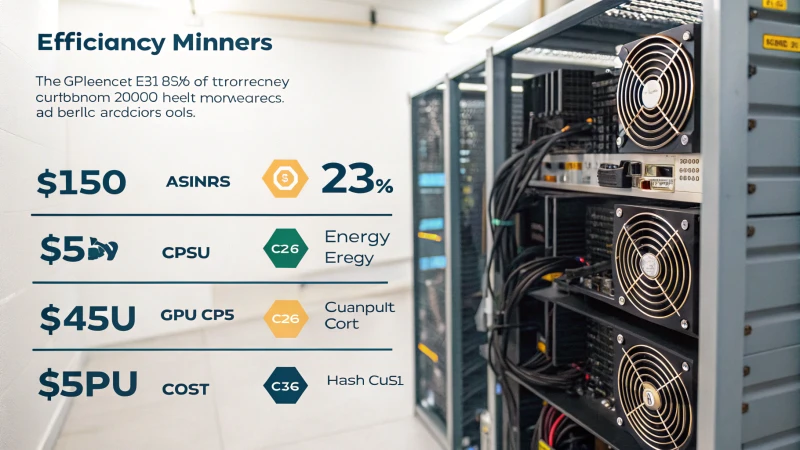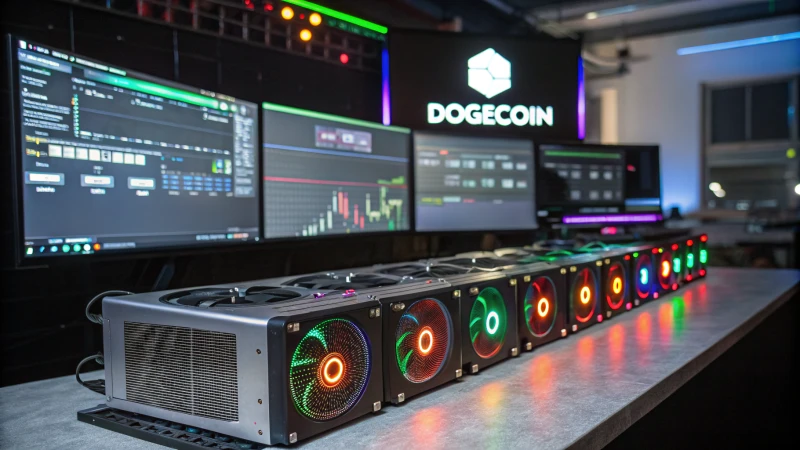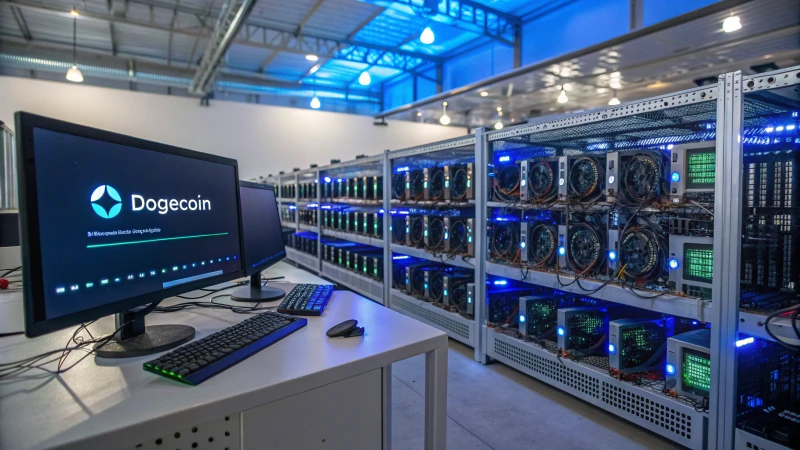
Interested in mining Dogecoin but unsure how long it takes to see results? You’re not alone!
Mining Dogecoin takes about one minute per block, which rewards 10,000 DOGE. However, the exact time to mine smaller amounts like one DOGE depends heavily on the hardware used—ASIC miners are the fastest, followed by GPUs and CPUs.
While this gives a quick snapshot of mining timeframes, there’s much more to understand about the mining process. Dive into our detailed guide to uncover insights on how different factors can influence your mining efficiency and success.
What Factors Influence Dogecoin Mining Time?
Dogecoin mining time can vary greatly depending on multiple factors. Understanding these elements can help miners optimize their setup and maximize efficiency.
Dogecoin mining time is influenced by hardware hashrate, network difficulty, and equipment type. Efficient ASIC miners, lower network difficulty, and higher hashrate can reduce mining time significantly.

The Impact of Hashrate
Hashrate refers to the processing power miners use to solve complex mathematical puzzles. A higher hashrate enables faster mining as it increases the chances of solving a block more quickly.
| Mining Equipment | Average Hashrate (MH/s) | Estimated Time for 1 DOGE |
|---|---|---|
| ASIC Miner | 5000 | ~8 minutes |
| GPU (RTX 3060) | 60 | ~9.6 hours |
| CPU | 0.02 | ~1,325 days |
Understanding Network Difficulty
Network difficulty adjusts approximately every 240 blocks to ensure that blocks are mined every minute. As more miners join the network, the difficulty increases, making it harder to mine blocks quickly. Conversely, when miners leave, the difficulty decreases.
Equipment Efficiency: ASIC vs. GPU vs. CPU
The type of equipment used greatly influences mining efficiency. ASIC miners are specifically designed for cryptocurrency mining and are much more efficient than GPUs and CPUs.
- ASIC Miners: Provide the best efficiency due to their high hashrate capabilities.
- GPUs: Offer a balance between efficiency and cost, suitable for hobbyists.
- CPUs: Generally not recommended for Dogecoin mining due to their low processing power.
Block Time and Rewards
Dogecoin’s block time is set at 1 minute, and each block rewards 10,000 DOGE. While this means a block is added frequently, the actual mining time for smaller amounts of DOGE is dependent on the miner’s hardware efficiency and current network difficulty.
Understanding these factors can guide miners in optimizing their strategies for faster Dogecoin mining. Choosing the right equipment and staying updated on network difficulty changes are crucial steps for any aspiring Dogecoin miner.
How Do Different Mining Hardware Affect Efficiency?
The efficiency of mining hardware directly impacts the profitability and sustainability of cryptocurrency operations. Explore how various devices from ASICs to CPUs compare in terms of speed and energy usage.
Mining hardware affects efficiency through its hash rate, energy consumption, and cost. ASIC miners are generally more efficient than GPUs and CPUs, offering higher hash rates at lower energy costs per transaction processed.

Understanding Mining Hardware Types
Mining hardware can be broadly categorized into three types: ASICs, GPUs, and CPUs. Each has unique attributes affecting mining efficiency.
ASIC Miners:
- Hash Rate: High hash rates, reaching up to 100 TH/s, make ASIC miners ideal for large-scale operations.
- Energy Consumption: These devices are optimized for specific algorithms, leading to superior energy efficiency compared to general-purpose devices.
- Cost: Initial costs are high, but operational savings often justify the investment over time.
GPUs:
- Hash Rate: Typically lower than ASICs, around 30 MH/s for cards like the RTX 3060 Ti.
- Energy Consumption: Moderate, making them suitable for smaller operations or hobbyists.
- Cost: More affordable initially but less efficient long-term compared to ASICs.
CPUs:
- Hash Rate: Very low, generally not recommended for serious mining endeavors.
- Energy Consumption: High relative to output, making them inefficient.
- Cost: Low upfront costs but high operational expenses.
Energy Efficiency Metrics
When evaluating mining hardware, metrics like Joules per Terahash (J/TH) are crucial. ASIC miners often exhibit the lowest J/TH values, indicating high efficiency. Here’s a comparison table:
| Hardware Type | Average J/TH | Use Case |
|---|---|---|
| ASIC | 30 J/TH | Large-scale mining |
| GPU | 150 J/TH | Small-scale/hobby mining |
| CPU | 2000 J/TH | Rarely used for mining |
Factors Influencing Efficiency
Hardware Configuration:
Efficient cooling systems and overclocking can enhance performance. However, these adjustments must be balanced with energy costs and hardware longevity.
Network Difficulty:
Higher difficulty levels demand more computational power, affecting efficiency. This factor varies across cryptocurrencies and should be considered when choosing hardware for mining.
Real-World Examples
Case studies reveal that miners using ASIC devices often achieve quicker ROI due to their efficiency. Conversely, GPU miners can benefit from versatility, as they can switch between different coins based on profitability.
Analyzing these aspects helps in understanding which mining setup suits your needs best, considering both current market conditions and long-term goals.
Is It Profitable to Mine Dogecoin in 2025?
As cryptocurrency continues to evolve, potential miners are questioning the profitability of mining Dogecoin in 2025. With fluctuating market conditions and technological advancements, understanding the dynamics of Dogecoin mining is crucial.
Mining Dogecoin in 2025 may be profitable if miners optimize their hardware, minimize electricity costs, and capitalize on favorable market conditions. Assessing these factors can help determine potential returns.

Understanding Dogecoin Mining Mechanics
Dogecoin, known for its vibrant community and meme-inspired origins, operates on a proof-of-work mechanism similar to Bitcoin. In 2025, block rewards continue to provide 10,000 DOGE per block mined.
| Mining Method | Approximate Time to Mine 1 DOGE |
|---|---|
| ASIC Miners | 0.12 minutes |
| GPUs | 9.6 hours |
| CPUs | 1,325 days |
Factors Influencing Profitability
1. Hardware Efficiency: ASIC miners remain the most efficient for Dogecoin. Investing in high-performance hardware can increase profitability.
2. Electricity Costs: Electricity remains a significant expense in mining. Miners should explore regions with lower energy costs or renewable energy options.
3. Market Trends: Understanding market trends and price fluctuations is essential for predicting potential returns. Monitoring these trends can inform strategic decisions.
Challenges and Opportunities
Dogecoin mining faces challenges, such as increasing mining difficulty and regulatory changes. However, opportunities exist in evolving technologies and innovative mining pools that could enhance returns.
Cost-Benefit Analysis
Evaluating profitability involves calculating potential earnings against costs. Consider factors like hardware depreciation, maintenance, and electricity to gauge net returns.
| Factor | Consideration |
|---|---|
| Hardware Costs | Initial investment vs. long-term gains |
| Energy Consumption | Impact of electricity rates |
| Market Conditions | Influence of DOGE’s market price |
By analyzing these components, miners can better understand the economic viability of their operations in 2025.
Should You Join a Dogecoin Mining Pool?
Considering joining a Dogecoin mining pool? Discover the advantages and disadvantages to help you make an informed decision. Whether you’re new to mining or experienced, this guide is for you.
Joining a Dogecoin mining pool can increase your chances of earning rewards by combining your computational power with others. It offers consistent payouts but includes fees and shared profits.

What is a Dogecoin Mining Pool?
A Dogecoin mining pool is a collective of miners who pool their computational resources to increase the likelihood of solving blocks and receiving rewards. Instead of mining solo, participants share both the work and rewards, which can lead to more consistent payouts.
- Efficiency: By joining a pool, you utilize combined hash power, increasing the chances of earning block rewards.
- Consistent Payouts: Pools distribute earnings among members, providing smaller but regular payouts compared to solo mining.
Pros and Cons of Joining a Pool
Pros:
- Higher Chances of Success: Pooling resources means that even small-scale miners can compete against larger setups.
- Regular Income: Unlike solo mining, where payouts are less predictable, pools offer steady income streams.
| Pros | Cons |
|---|---|
| Higher success rate | Pool fees |
| Steady payouts | Shared rewards |
| Access to resources | Less independence |
Cons:
- Fees: Pools typically charge fees, which can affect profitability.
- Shared Rewards: Profits are divided among all members, reducing individual earnings.
Selecting the Right Pool
When choosing a mining pool, consider factors like fees, payout structure, and community reputation. Research forums and reviews to gauge user experiences. Look for pools that align with your hardware capabilities and financial goals.
Key Considerations:
- Fee Structure: Understand how fees impact your earnings.
- Payout Frequency: Some pools pay daily, while others may take longer.
- Reputation: Community feedback can provide insights into a pool’s reliability and fairness.
Conclusion: Balancing Profit and Effort
While joining a Dogecoin mining pool can be beneficial for those seeking more predictable returns, it requires balancing potential profits with fees and shared rewards. Evaluate your mining goals and resources to determine if pool participation aligns with your objectives.
What Are the Environmental Impacts of Dogecoin Mining?
As Dogecoin gains popularity, concerns about its environmental impact have risen. Like many cryptocurrencies, Dogecoin mining relies on energy-intensive processes. But what exactly are the implications for our planet?
Dogecoin mining impacts the environment through high energy consumption and carbon emissions, similar to Bitcoin. Its proof-of-work algorithm requires significant electricity, contributing to greenhouse gases and environmental degradation.

Energy Consumption in Dogecoin Mining
Dogecoin, much like its more famous counterparts, operates on a proof-of-work (PoW) algorithm. This method is notoriously energy-hungry because it requires miners to solve complex mathematical puzzles to validate transactions. Unlike Bitcoin, which uses SHA-256, Dogecoin utilizes Scrypt. While Scrypt can be slightly more efficient, it still demands substantial energy.
| Cryptocurrency | Algorithm | Energy Consumption |
|---|---|---|
| Bitcoin | SHA-256 | High |
| Dogecoin | Scrypt | Moderate |
The broader adoption of Dogecoin has led to an increase in the energy consumption associated with its mining activities.
Carbon Footprint and Emissions
The electricity used in mining often originates from non-renewable sources, leading to considerable carbon emissions. For example, when miners utilize coal-powered electricity, they significantly increase their carbon footprint. Recent studies highlight that cryptocurrency mining contributes to approximately 0.5% of global electricity consumption, a sizeable chunk that impacts the planet’s ecological balance.
Efficiency of Mining Equipment
Miners typically employ different hardware for Dogecoin mining:
- ASIC Miners: These specialized devices offer high efficiency and speed but consume significant power.
- GPUs: More versatile but less efficient compared to ASICs.
- CPUs: Least efficient, making them impractical for serious miners.
The choice of equipment can drastically alter the environmental impact. Miners opting for ASICs might achieve faster results but at a higher environmental cost due to increased energy usage.
Solutions and Alternatives
To mitigate environmental impacts, miners are encouraged to:
- Transition towards renewable energy sources.
- Optimize mining operations by upgrading to more efficient hardware.
- Support developments in green technologies such as proof-of-stake (PoS), which promises lower energy requirements compared to PoW systems.
In conclusion, while Dogecoin offers a fun and engaging cryptocurrency experience, its environmental implications remain a critical consideration for enthusiasts and investors alike. By understanding these impacts and exploring greener alternatives, the community can contribute towards more sustainable crypto solutions.
Conclusion
Mining Dogecoin takes about one minute per block, yielding 10,000 DOGE. Actual time for smaller amounts varies significantly based on hardware efficiency and network difficulty.
- This link explains hashrate’s role in crypto mining efficiency.
- Learn how network difficulty changes impact mining success.
- Explore effective strategies to enhance Dogecoin mining efficiency.
- Exploring this link offers insights into how different mining hardware efficiencies can impact your overall mining profitability.
- Discover why ASIC miners lead in efficiency compared to GPUs, crucial for optimizing mining operations.
- This link provides valuable setups for beginners looking to optimize their mining operations efficiently.
- Understanding the block reward is essential for calculating potential earnings from mining activities.
- Renewable energy can significantly reduce electricity costs and increase mining profitability.
- Monitoring price trends helps predict potential returns from mining activities.
- Mining difficulty impacts how quickly miners can find blocks and earn rewards.
- An economic viability analysis helps miners assess the financial feasibility of their operations.
- Explore how pooling resources increases your chances of earning block rewards.
- Discover tips on selecting a reliable mining pool that suits your needs.
- Learn how to align your mining activities with specific financial objectives.
- Explore detailed analyses and data on how much energy Dogecoin mining consumes globally.
- Learn how different mining equipment affects the environment and why ASIC miners are often criticized.
- Discover sustainable cryptocurrency options that use less energy compared to traditional proof-of-work systems.

